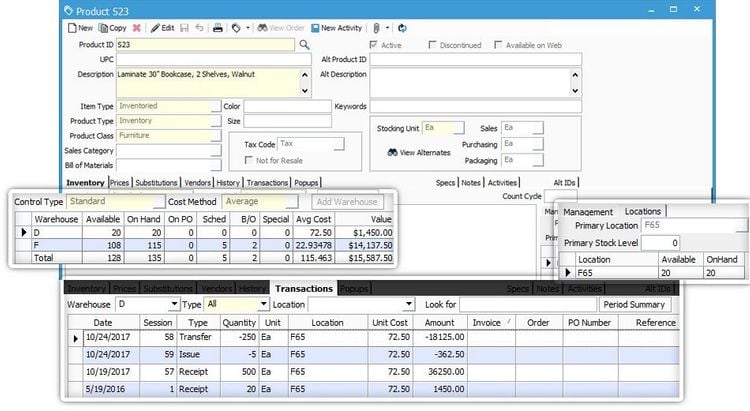The Best Medical Inventory Software
In this guide, we assessed the top platforms for tracking healthcare supplies and medical equipment. We evaluated the most popular platforms for core features like medication traceability, purchase order tracking, and custom replenishment thresholds.
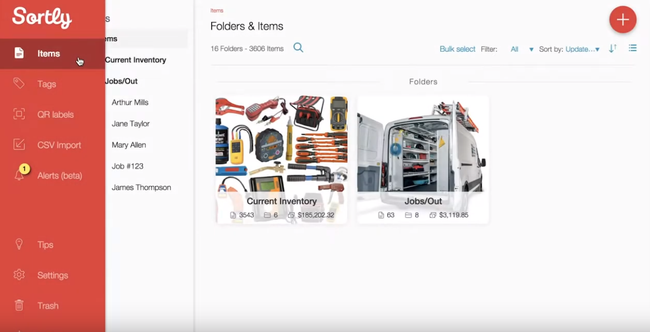
- Straightforward and intuitive
- Very affordable
- Excellent visual interface with customizable colors
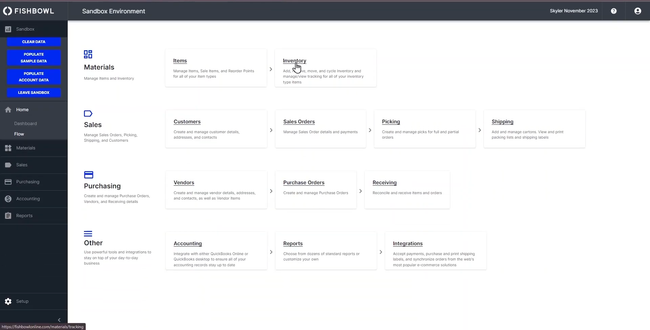
- Competitive pricing; does not require a subscription
- Integrates with QuickBooks
- Can function as a light MRP system
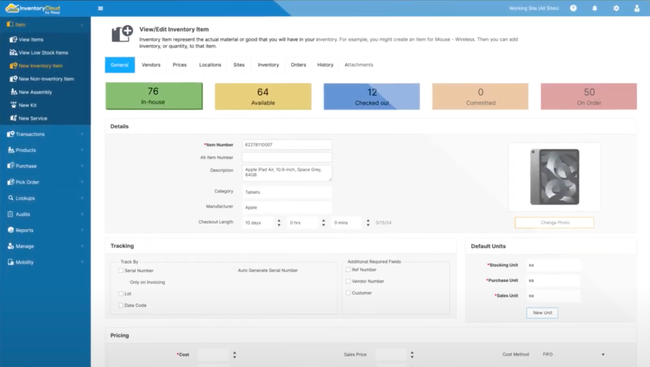
- Bundling and kitting features for diverse inventory types
- Intuitive app for mobile data input
- Low learning curve for beginners
We ranked the top platforms for specific healthcare facilities, including independent practices, live-in care centers, and hospitals.
- Sortly: Best for Independent Practices
- Fishbowl Inventory: Best for Hospitals
- WASP InventoryCloud: Best for Live-In Care Centers
- FlexScanMD: Best for Ambulatory Surgery Centers
Sortly - Best for Independent Practices
Sortly’s quantity and expiration date alerts make this platform especially useful for independent practices managing smaller-scale inventory compared to large hospitals. Automated notifications for high-turnover items like gloves, syringes, and bandages help you stay on top of inventory even when operating with leaner teams.
You can select an inventory item like a certain medication and set a minimum quantity alert; when stock levels reach this threshold, Sortly automatically sends a notification. These include in-app alerts, push notifications, and emails, so you can stay informed even when you’re not using the app. You can even customize the timing to alert specific days, weeks, or months in advance and to repeat at intervals so no outdated supplies remain in your inventory.
Additionally, Sortly allows you to add expiration dates to items like vaccines, antibiotics, or other perishable medical supplies. You can configure notifications to alert staff a certain number of days before the item expires, which helps you avoid costly waste and maintain regulatory compliance and patient safety.
By reducing the need for manual inventory checks, Sortly frees up your staff to focus on patient care rather than administrative tasks. Sortly starts at $24/month for an annual subscription, tracking 500 unique items and including two user licenses. There’s also a free option that tracks up to 100 unique items and includes one user license. This puts Sortly on the lower end of the pricing bracket, ideal for small independent practices.
Read our full review of Sortly for pros, cons, and pricing plans.
Fishbowl Inventory - Best for Hospitals
Fishbowl Inventory offers large healthcare settings like hospitals an efficient way to track and trace surgical supplies, medications, and medical equipment. Your team can manually enter tracking information, like batch or lot numbers, or let the software handle it with its auto-assign feature. Staff can then store your stock in their designated locations.
Fishbowl’s traceability tools include key capabilities tailored for healthcare:
- Serial Number Tracking: Maintain accurate usage history for high-value equipment and medical devices.
- Lot Number Tracking: Track medications and supplies by batch, useful in the event of product recalls or adverse reactions.
- Recall Management: Generate reports to locate all affected items and show where they’ve been used or stored, down to the patient or department level.
- **Expiration Date Alerts: ** Receive notifications when medications and vaccines approach expiration, reducing costly waste and ensuring patient safety.
Subject to strict regulations, hospitals can use Fishbowl’s traceability features to maintain records required for compliance with agencies like the FDA, reducing their risk of fines. While the software takes some time to figure out—especially for those new to inventory management—demos and training tutorials can help ease the transition. The processes are fairly straightforward, but new users will likely need time to get comfortable with its more intricate features.
Learn more about key features, ratings, and pricing in Fishbowl Inventory.
WASP InventoryCloud - Best for Live-In Care Centers
WASP InventoryCloud supports a reliable supply chain for managing a mixture of prescriptions and daily products like food and toiletries for patients. When stock levels dip below a set threshold in the system, InventoryCloud automatically flags these for replenishment. Your staff can then use the purchase order tool to quickly review all items that need restocking, reducing manual work in high-demand settings like memory care and hospice.
The purchase order process is semi-automated; InventoryCloud suggests reordering items, and staff simply confirm and select vendors for each item directly within the system. This streamlines the ordering process by eliminating the need for external systems and keeping vendor communication seamless.
Once InventoryCloud sends the purchase order, it tracks its progress. Your staff can monitor pending orders and expected delivery dates. They’ll also receive alerts if an order hasn’t arrived by a specified time, including in-app pop-up notifications and emails. This helps you stay informed of any delays so you can take the steps necessary to address potential supply chain issues.
WASP InventoryCloud starts at $1,295 annually for one user and supports one medical site. If you need to manage multiple sites, the Complete Plan is $3,995 annually for five users.
View our product page to learn more about WASP InventoryCloud.
FlexScanMD - Best for Ambulatory Surgery Centers
FlexScanMD’s preference cards module categorizes items by linking supplies and equipment with certain surgical procedures and individual provider preferences. Tailored to each surgeon’s habits and requirements, preference cards ensure that only essential items are prepared for surgeries. This helps you avoid last-minute scrambles for missing materials and provide better care to your patients.
When you schedule a procedure in the system, FlexScanMD auto-generates digital pick lists for your staff. As they gather supplies, they can scan barcodes to verify each item while the software adjusts stock levels in real time. You can even set PAR thresholds, and FlexScanMD will auto-trigger reorders when inventory drops to a preset limit.
Additionally, this medical inventory software tracks and analyzes supply costs across procedures. You can compare them closely to spot inefficiencies and tweak your purchasing habits, reducing overstocking and expired item disposal. It supports unlimited providers, locations, and users, so it’s ideal for multi-location transfers and tracking.
What is Medical Inventory Software?
Medical inventory software manages healthcare products at your facility. Inventory systems manage everything from pharmaceuticals and surgical supplies to outpatient consumables and gift shop products.
While there are general inventory management systems out there, healthcare facilities need custom software. While a traditional brick-and-mortar store needs to manage inventory like apparel or food, the healthcare industry has to handle controlled substances and delicate medical devices. Medical inventory software manages all your industry-specific products so you can stay focused on treating patients and providing the best healthcare possible.
Features of Medical Inventory Software
- Inventory costing: Establishes the cost value of individual inventory using FIFO/LIFO and other factors to provide profitability and tax information
- Stock count tracking: Records all on-hand units of products based on SKU or other tracking factors
- Medication traceability: Track medication by lot, barcodes, RFID, or serial numbers for quality assurance and product recalls; receive updates when medication batches are set to expire
- Purchase order tracking: Stay on top of new and recurring orders for medical materials
- Reporting and audit management: Receive reports on sales, purchase orders, and revenue; reconcile inventory records against actual item stock counts to locate discrepancies and prevent loss
- Inventory hold management: Reserve current stock to fill customer orders; prevent duplicate orders when products are out-of-stock
- Replenishment thresholds: Specify the stock count level to signal its time to reorder products; set automated notifications for out-of-stock and low-stock situations
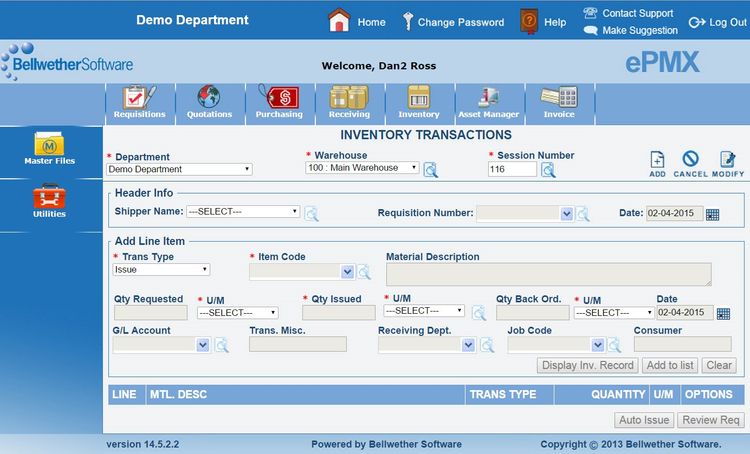
Audit and Compliance Features
Medical inventory management software provides audit trails and secure data collection to help keep thorough records of stock movements.
Regulatory Compliance and Financial Oversight
Hospital inventory management systems help you track, store, and distribute valuable medications and equipment. Check to make sure your chosen platform adheres to ISO 9001’s general quality management principles. Additionally, the software should abide by ISO 13485, which ensures quality management for medical devices. ISO 14971 helps you manage risks associated with medical devices, from improper storage to expiration. This makes it easier to trace defective items and remove them from inventory.
Financial forecast reports should also feature in the system; these can help you project future inventory needs and budget for medical supplies more efficiently. Overall, the platform should sync financial and inventory data to help you better plan purchases while cutting waste.
Inventory Traceability and Reconciliation
Inventory traceability helps you monitor stock from procurement through distribution. Your healthcare inventory management system should allow you to log inspection details for pharmaceuticals, consumables, and medical devices. This makes it simpler for your staff to verify all items are in compliance before use. Plus, inventory reconciliation tools let you quickly spot any discrepancies between recorded stock levels and physical inventory, minimizing loss.
Audit Trails and Reporting
A medical stock inventory system should also include the ability to generate audit reports. These track every stock-related process, from additions to usage and disposal. A complete audit trail will provide a full history of user attribution, showing who accessed, modified, or moved inventory items. This is vital when ensuring accountability for handling high-risk medical devices and controlled substances.
Key Benefits
Using a medical inventory system can benefit your healthcare facility in several ways:
Accurate Product Inventory
Healthcare facilities are often hectic, and manually tracking inventory is incredibly difficult. Yet you need a way to ensure you have all your medication, surgical supplies, and other medical materials in stock. Any miscount you or your staff make could lead to shortages. Upgrading spreadsheets to automated medical inventory software can save time by preventing human error.
By using an inventory system, you can reduce human error, which often leads to missing medication and product shortages. Further, a digitized record lets you get real-time updates on drug usage and supply status from any mobile device.
Manage FIFO/LIFO, Product Expirations and Recalls
When medical products expire, they must be efficiently removed from your stock. Expired drugs may not work as intended and can cause additional health problems to your patients. Streamline your product removal processing by setting automated alerts for when prescriptions expire.
If a drug is recalled, traceability modules can organize your collection and disposal efforts. The Food and Drug Administration (FDA) has guidelines for how to properly handle and dispose of harmful and defective medication. After the drug is safely removed, automatically update your stock to reflect the new counts and mark which medications are safe alternatives.
Manage Your Budget
Drugs are incredibly costly. Changes in patent status can lead to sudden changes in the price of medication. With inventory costing software, you can accommodate price increases and decreases in your budget. If a medication is too expensive to purchase regularly, you can look for cheaper generics to keep your costs down.
Controlled Substance Compliance
Many medications are defined as “controlled substances” and cannot be dispensed without a prescription. Yet you need to keep these drugs in stock for your patients. How do you protect these medications? The first step is keeping accurate counts at all times. Next, know who is allowed access to certain drugs and who has an active prescription.
Which Healthcare Facilities Can Use Medical Inventory Systems?
- Hospitals: Large medical facilities like hospitals have to manage medical inventory across multiple departments. In addition to drugs, the products they handle may range from surgical supplies to medical devices. There may also be a pharmacy that runs within the hospital.
- Pharmacies: Medical inventory solutions can be used by independent pharmacies or those that operate as part of larger retail chains. Pharmacies may offer a mixture of OTC drugs and prescription medications.
- Independent practices and clinics: Private clinics offer various specialties. Medical inventory software can be customized to manage the highly specific products and services you offer.
- Hospice centers, memory care, and assisted living facilities: End-of-life centers manage medication, food, and toiletries for patients. Like hospice, live-in care centers offer patients a mixture of prescriptions and daily products.
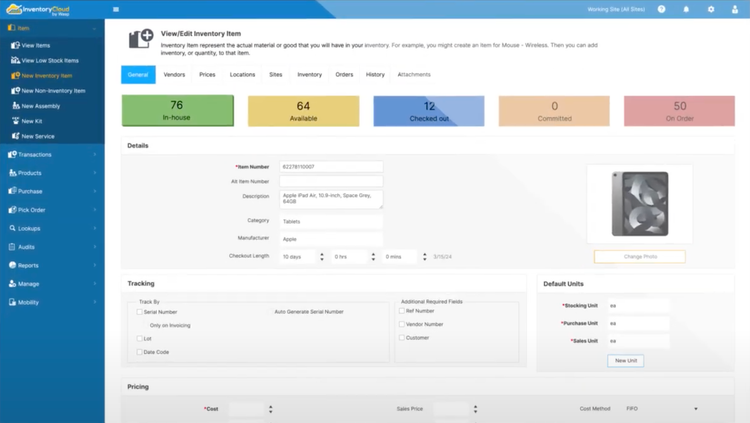
HIPAA Compliance with Patient Prescriptions
Medical centers are switching to electronic health records (EHR) to secure patient information. This digitized system lets doctors and nurses update patient prescriptions online. General inventory management systems do not account for HIPAA regulations. By using specialized medical inventory software, you can maintain HIPAA compliance when recording which items your facility uses with specific patients.
Inventory Management Issues
There are many unique problems with medical inventory management which can be solved by using the right software:
Product Shortages During Emergencies
The last thing you want to deal with during a global pandemic is a shortage of basic essentials at your medical facility. Medical inventory software organizes all your patient and medication records in easy-to-access locations so you can prevent shortages. See which drugs are about to run out and get your orders in before everyone else.
A benefit of medical inventory software is that it accounts for more than just medications: you can track consumables like gloves, wipes, face masks, and other supplies you might need in an emergency situation. Set automated replenishment thresholds to alert your staff of low-stock products so you can reorder before you run out.
Theft of Controlled Substances
While traditional storefronts only need to worry about revenue loss from shoplifting, medical facilities that lose track of medications may face fines and citations for violating controlled substance regulations. The FDA even has special measures to protect the integrity of the drug supply chain to prevent contamination, tampering, and theft.
A medical inventory management system keeps you in control of harmful substances and compliance with FDA guidelines. You’ll be able to maintain an accurate record of which drugs are in stock and which have been dispensed.
Integrating Medical Supplies with General Products
Many pharmacies coordinate with retailers to supply customers with medications and essentials in one place. Even hospitals have gift shops and cafeterias. A single inventory management system may not be enough to account for all the intricacies of medical inventory and your general stock.
For example, you might work with medical devices like pacemakers and heart valves that must meet production tracking regulations. In the event of device failure, you’ll need to track which products are still in your inventory. Otherwise, a patient could wind up with a defective heart valve. While general inventory management tools can provide some traceability for expired food and beverages, it’s simply not designed for the rigorous tracking of medical devices and controlled substances.
